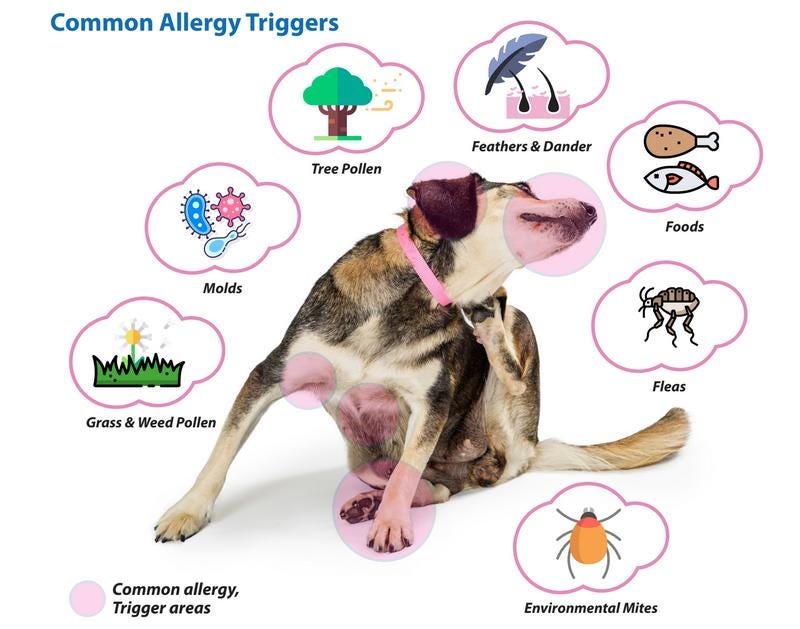Dog allergy symptoms in adults include sneezing, coughing, wheezing, skin rash, and watery eyes. These symptoms typically occur after contact with dogs or being in a dog-friendly environment.
Allergies can significantly impact daily life and overall well-being. If you suspect you have a dog allergy, it’s essential to consult with a healthcare professional for proper diagnosis and treatment options. Understanding the symptoms and seeking appropriate care can help alleviate discomfort and improve quality of life.
We will explore common dog allergy symptoms in adults, potential triggers, and effective management strategies to help you navigate this condition effectively.

Credit: medium.com
Common Dog Allergy Symptoms
Experiencing dog allergy symptoms as an adult can be challenging, but recognizing the signs is crucial. Symptoms include sneezing, itchy eyes, skin rashes, and respiratory issues when in contact with dogs. Seeking medical advice and managing exposure can help alleviate these symptoms and improve the quality of life for dog lovers.
| Respiratory Symptoms |
| Adults with dog allergies may experience sneezing, runny nose, nasal congestion, and coughing. |
| Skin Symptoms |
| Itchy skin, rash, hives, and eczema are common skin reactions to dog allergens. |
Understanding Allergens
Dog allergies are quite common in adults, and understanding the allergens can help manage the symptoms effectively. One of the most common allergens is dog dander. Dander is made up of tiny flecks of skin that dogs shed. These flecks can be found in your home, furniture, and carpets, even long after the dog is gone.
Saliva and urine are other sources of allergens. Dog saliva can contain proteins that trigger an allergic reaction in sensitive individuals. These proteins can stick to surfaces, such as clothing or furniture, and may remain active for long periods of time. Similarly, traces of dog urine can also contain allergens that can cause symptoms like itching, sneezing, and watery eyes.
Factors Affecting Allergy Severity
Dog breeds: Certain breeds are more prone to triggering allergies in adults.
Home environment: Factors such as carpeting and frequent cleaning can impact allergy severity.
Difference From Other Allergies
Difference from Other Allergies:
Food Allergies:
Allergies to certain foods in adults can manifest in various ways. Symptoms may include:
- Itchy skin
- Hives or rash
- Nausea or vomiting
- Diarrhea
- Abdominal pain
Seasonal Allergies:
Seasonal allergies in adults can cause different symptoms compared to dog allergies, such as:
- Sneezing
- Runny or stuffy nose
- Watery eyes
- Itchy throat or ears
- Headaches
Please note that dog allergies in adults can present symptoms:
- Itchy or red skin
- Sneezing or coughing
- Wheezing or shortness of breath
- Watery or itchy eyes
- Nasal congestion
If you experience any of these symptoms, consult with a healthcare professional for an accurate diagnosis and appropriate treatment.
Diagnosing Dog Allergies
When it comes to identifying dog allergy symptoms in adults, doctors will usually start by taking a detailed medical history. This helps them understand any past reactions to dogs or other allergens. Allergy testing may also be recommended to pinpoint specific triggers.
Skin prick tests and blood tests are commonly used to determine allergic reactions to dog dander and saliva. By examining the results and considering the patient’s history, healthcare providers can make an accurate diagnosis. Once dog allergies have been confirmed, necessary steps can be taken to manage symptoms and improve quality of life.

Credit: chappellevet.ca
Managing Dog Allergies
If you are an adult with dog allergies, there are ways to manage your symptoms. One strategy is to avoid exposure to dogs as much as possible. This could mean not having a dog in your home or minimizing contact with dogs in other environments. Another way to manage dog allergies is through medication and immunotherapy. Medications such as antihistamines and corticosteroids can help relieve symptoms, while immunotherapy involves gradually exposing the body to allergens to decrease sensitivity.
Impact On Quality Of Life
Dog allergy symptoms in adults can significantly impact quality of life. Physical symptoms include sneezing, wheezing, and itchy eyes. Emotional well-being may be affected by constant discomfort and frustration. Managing allergies is crucial for overall well-being.
Creating Allergy-friendly Environments
Creating Allergy-Friendly Environments
Allergies to dogs can be a challenge for dog owners, but there are steps you can take to create an allergy-friendly environment. For pet owners, it’s important to keep your home clean by vacuuming regularly and using air purifiers. Keep pets out of bedrooms and establish pet-free zones in the house. Wash your pet’s bedding frequently to help reduce allergens. Consider using hypoallergenic pet products that are designed to minimize allergens.
For non-pet owners visiting homes with dogs, it’s helpful to ask about the presence of dogs and take precautions if necessary. Wash your hands after coming into contact with pets and avoid touching your face to minimize exposure to allergens. By implementing these tips, you can create an allergy-friendly environment for both pet owners and non-pet owners.
:max_bytes(150000):strip_icc()/GettyImages-184988794-570278d83df78c7d9e6c1244.jpg)
Credit: www.verywellhealth.com
Frequently Asked Questions
How Do I Know If I’m Allergic To Dogs?
Allergy symptoms from dog dander include sneezing, runny nose, itchy eyes, or skin rash. Consult an allergist for diagnosis.
Can You Live With A Dog If Allergic?
Yes, it’s possible to live with a dog if allergic by taking allergy medications and reducing exposure.
Why Am I Allergic To My Dog All Of A Sudden?
You may have developed dog allergies due to increased exposure or changes in the dog’s dander. Hormonal changes, stress, or a weakened immune system can also trigger sudden allergies. Consult an allergist to determine the cause and explore treatment options.
What Is The Best Allergy Medicine If You Are Allergic To Dogs?
The best allergy medicine for dog allergies is usually antihistamines such as loratadine or cetirizine. It may also help to manage symptoms by frequently washing bedding and vacuuming to reduce dust and dander. Always consult with a doctor or allergist for the most suitable treatment.
Conclusion
Recognizing dog allergy symptoms in adults is crucial for optimal health. Early identification can lead to effective management strategies and a higher quality of life. By staying informed and seeking proper medical guidance, individuals can find relief and enjoy a harmonious relationship with their furry companions.

Hello, I’m Daniel Johnson. I Studied animal science at the University of Florida. I am a seasoned veterinarian deeply committed to ensuring the health and happiness of every dog. With extensive expertise in dog health, I contribute my knowledge to Dog Advisor Pro to help dog owners understand and address their pet’s health concerns. My passion is making veterinary advice accessible and understandable to all, allowing dog owners to provide the best care for their furry friends.


